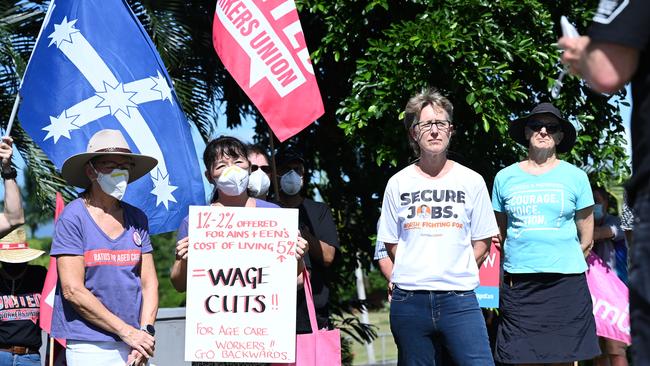ACTU’s low profile paying dividends for Labor campaign
Anthony Albanese’s muddled message on wage rises still hit home with people doing it tough in a post-pandemic world.

A joke, of course. It is probably just sheer discipline, enforcing a strategic decision, crafted after copious research including polling and focus groups. In any case, it is undeniable, until now at least, the union movement has kept a low profile in this election campaign, and this has paid dividends for Labor.
The class warfare vibe so evident before the 2019 election thankfully has been absent this time. We haven’t seen the Opposition Leader rant against business or make bitter gibes about the “top end of town”, and there are no obvious moves to crush aspiration and frustrate the creation of individual wealth.
On the contrary, you may have noticed Anthony Albanese goes to great pains when saying Labor aims to “leave no one behind” to add that no one will be “held back” either. This may prove impossible to do in practice but in theory it sounds very reasonable.
Still, though, this line has created despair in some of the Labor base, who come from the mindset that every dollar created in a society belongs first to that society, and therefore the government. This means any earnings an individual is allowed to keep is a gift from the government, made at the expense of others.
It is this mindset that created the flawed policies that led to Labor’s loss last time. So now Labor true believers, who want their party in government and not in permanent opposition, have to swallow this pill – most people think the money they earn belongs to them, and no party will succeed if it is regarded as the one that takes too much of that money and holds the earner back.
To give the ACTU its due, during the past few years under the leadership of Sally McManus the peak body has inserted itself more cleverly into the public narrative.
It has spoken with more sense and less aggression, and argued various policy positions more effectively. Its latest push for a higher minimum wage will frighten some but not most because, after all, cost of living is a huge issue at the moment. There is a lot of pain out there.
In addition, the pandemic exposed the value, contribution and sacrifice of some of the lowest paid in our society. The wider community retains a sense of gratitude to the people who, in the depths of our fear and misery, went to work to clean, make, deliver, serve, nurse and generally keep things functioning while others stayed safe at home.
This month, after the Reserve Bank released its latest wage forecast, the ACTU put out a media release about the “real wage cuts until end of 2023”.
The RBA data meant, it said, 21 months of consecutive real wage cuts for working people, leading to a situation where in “the middle of 2023 the real value of wages will still only be at the level they were at the end of 2011”.
Another media release pointed out the number of Australians who needed more than one job to make ends meet.
Australian Bureau of Statistics data shows there are 867,000 people working more than one job, which is allegedly a record high. McManus said this outcome was “the result of nearly a decade of low wage growth and inaction on job security from this government”. The “lasting legacy of this government”, she said, was “working people watching their wages go backwards while the Prime Minister tells them it can’t be helped”.
This week, Albanese made comments in support of wage rises that keep pace with inflation. He said: “I believe the minimum wage should at least keep up with the cost of living.” This comment prompted fears of runaway wages that simply would add to inflationary pressure. Business owners are already contending with supply chain disruption, staffing shortages and persistent absenteeism, along with rising costs. The prospect of large wage increases would make many of them nervous.
At the end of the day it is the job of the Fair Work Commission to balance all of these considerations and make rulings. In the election context, though, both major parties are trying to secure the vote of the working person, especially in marginal outer suburban and rural seats.
Labor’s pitch is wages should be kept in line with inflation because otherwise people fall too far behind. This is a position some economists might disagree with, using a chicken and egg argument, but at least it is clear.
The Coalition, on the other hand, has put up contradictory messages and tortured logic. The Prime Minister seems to think the working-class vote can be captured by brief references to culture war topics.
This underestimates the good nature of most people, in my opinion. I think while Australians are fiscally conservative, they are more socially progressive than social conservatives realise.
They certainly don’t want to see minorities picked on by politicians. Specifically, they are less concerned with the gender identity of other people’s children, and more concerned with being able to feed and house their own.



Are union officials the new quiet Australians?